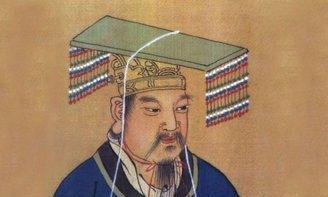In ancient times, population was the most important resource of a country, at that time labor and war mainly relied on manpower, a country with a large population and more labor, natural soldiers. It can be said that in ancient times, the size of the population was an important indicator of the strength of the country. Therefore, having many children and many blessings became the cultural identity at that time, so the ancients had the saying of "a thousand blessings and a hundred billion descendants". Not only the common people worked hard to have more children, but also the royal families of all dynasties. So, among the emperors of China's thousand-year-old dynasty, who is the champion with the most children?

Zhou Wenwang (from the network)
The highest number of sons in history
According to legend, King Wen of Zhou had 100 sons, but we can no longer verify whether this achievement is true or not, because the age is too old. Since the Qin Dynasty, there are more detailed historical materials on the situation of the emperor's children, such as in the "History of History. In the Five Emperors' Family, it is recorded that Liu Sheng, the prince of Zhongshan, the brother of Emperor Wu of Han, had more than 120 sons, which is the highest record for many sons in China's history.
Song Huizong (from the network)
The first three sons of the emperor
In the emperor, the champion of many sons was Emperor Huizong of the Great Song Dynasty, who had 31 sons and 34 daughters in his lifetime, a total of 65, and was the champion of many children among the emperors. The runner-up was Emperor Xuanzong of the Tang Dynasty, who had 30 sons and 31 daughters, for a total of 61. The Kangxi Emperor of the Qing Dynasty ranked third with 35 sons and 20 daughters. If you count the sons alone, the largest number of emperors is Emperor Chen Xuan, who has a total of 42 sons.
Tang Xuanzong stills (from the internet)
Emperors all had a large number of concubines, so almost all of them had a large number of children, such as Wei Wu Cao Cao had 26 sons, Emperor Wu of Jin also had 25 sons, and Ming Taizu Zhu Yuanzhang had 26 sons. But is it really a blessing to have more sons? In fact, this is not necessarily the case, and too many sons often becomes an important reason for the decline of a dynasty.
Kangxi Emperor (from the internet)
The disadvantages of emperors having many sons
Although the emperor owned the world, his children and grandchildren multiplied in large quantities, which often made this "world" unaffordable. For example, during the Western Han Dynasty, after Liu Bang became emperor, he made all his sons the king of the domain and gave them a large amount of land, and Liu Bang also practiced this practice after that. By the early years of the Han Jing Emperor, nearly half of the country's land and two-thirds of the country's financial revenue fell into the hands of the king of the domain, so the Han Dynasty became precarious. In order to solve this problem, the central government had to use the "Tui En" method to weaken the power of the feudal state, but it caused the Rebellion of the Seven Kingdoms and almost destroyed the Han Dynasty.
Stills of Han Jingdi (from the Internet)
The Ming Dynasty was also like this, because there were too many sons of the emperor and there were big problems. Zhu Yuanzhang stipulated that all his sons, except for the eldest son who was the crown prince, were all made the king of the domain; the sons of the king of the domain, except for the eldest son of the concubine, were all made the king of the county; and the son of the king of the county, the general of the feudal town state. Each king of the clan was supplied by the imperial court with 50,000 stones of rice, 25,000 pieces of money, 40 horses of brocade, 300 pieces of silk, 100 horses of yarn and luo, 80,000 pounds of salt, 1,000 pounds of tea, and 50 horses of hay. The king of the county paid 6,000 stones of rice per year, and other items were supplied in a lower proportion than that of the king of the clan.
Zhu Yuanzhang diagram (from the network)
After only 19 years, Zhu Yuanzhang felt overwhelmed, because by this time his descendants had already exceeded a hundred, and he could only greatly reduce the treatment he had previously given to the kings of the domain by two-thirds. Another 182 years passed, that is, the twenty-ninth year of Jiajing, when Zhu Yuanzhang's descendants increased to more than 100,000 people! Although the treatment of the princes of the clan was repeatedly reduced, it also cost more than a quarter of the total income of the imperial court. Such a heavy burden will naturally cause major social contradictions, and it can be said that the decline of the Ming Dynasty is largely caused by this situation.
Li Zicheng's revolt at the end of the Ming Dynasty (from the Internet)
epilogue
Another big problem is that the emperor has many descendants, but the emperor's throne is only one, so it is inevitable that there will be fierce competition, killing each other, and even causing war, so that the country will decline. For example, the "Rebellion of the Eight Kings" in the Western Jin Dynasty caused the dynasty to fall after only 20 years; emperor Xiaowu of the Southern Dynasty killed almost all the members of the clan in order to fight for power; the Sui Emperor killed his brother, and after becoming the crown prince, he killed his critically ill father. This series of tragedies is the cause of the collapse of many dynasties. Do you have any comment on that?